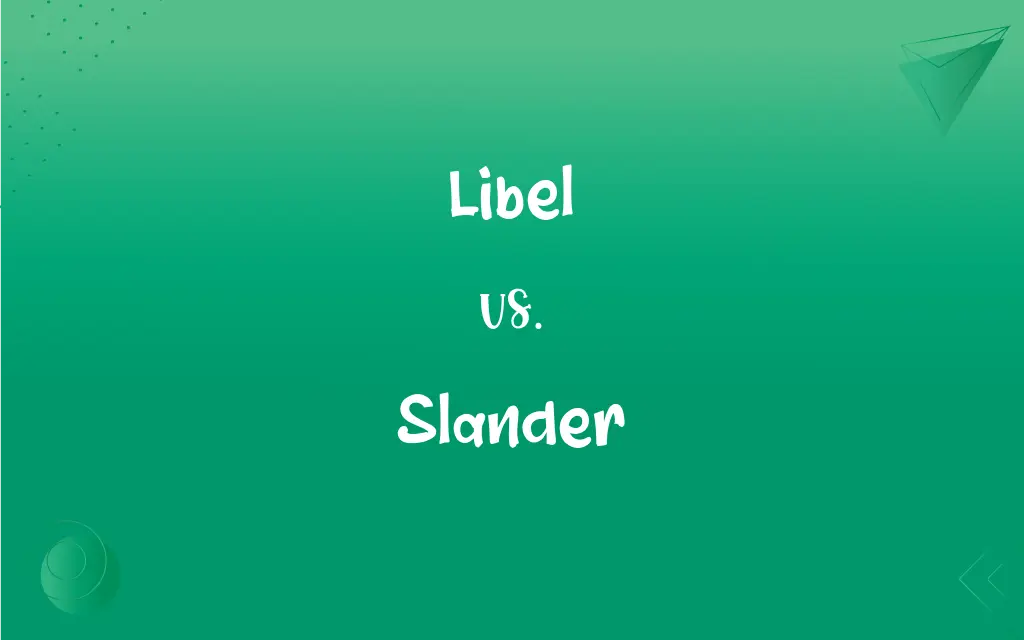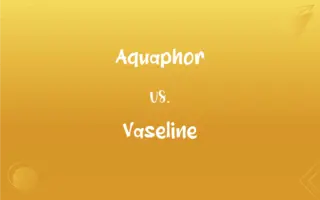Libel vs. Slander: What's the Difference?
Edited by Aimie Carlson || By Harlon Moss || Updated on October 17, 2023
Libel is defamation in written or fixed form; slander is spoken defamation.

Key Differences
Libel involves the making of defamatory statements in a printed or fixed medium, like a newspaper or online, whereas slander involves verbal defamation, typically spoken in a transient form. Both libel and slander are legal claims for false statements that harm a reputation.
Libel is often considered more harmful than slander since it has a permanence in its medium, allowing it to be seen by larger audiences, while slander is generally transient and may not reach as many people. However, both libel and slander can cause significant damage to a person's reputation and mental health.
In libel, the defamatory statement is preserved and can be seen or read repeatedly, but in slander, the statement is often fleeting, not captured or recorded. Despite these differences, both libel and slander are serious allegations that can result in legal ramifications.
Proving libel generally requires showing the publication of a defamatory statement, whereas proving slander involves demonstrating that the defamatory statement was heard by a third party. Both libel and slander require that the statement is false and caused damage.
In the context of damages, libel may result in higher compensation due to its lasting form and potential for wider dissemination, while slander, being temporary, might result in lesser damages. Nonetheless, both libel and slander cases can result in punitive damages if malice is proven.
ADVERTISEMENT
Comparison Chart
Medium
Printed or fixed.
Spoken.
Permanence
Permanent, can be revisited.
Transient, not typically recorded.
Proving
Requires showing publication.
Must be heard by a third party.
Damages
Potentially higher due to permanence.
Potentially lower due to transience.
Retraction
Can be difficult due to lasting nature.
Easier as it's often not recorded.
ADVERTISEMENT
Libel and Slander Definitions
Libel
Libel is a published false statement damaging a person's reputation.
Posting libelous statements online can lead to serious legal consequences.
Slander
Slander is the action or crime of making a false spoken statement damaging to a person's reputation.
A public figure filed a lawsuit for slander after false corruption charges were voiced on a radio show.
Libel
Libel is the act of disseminating defamatory material in written or pictorial form.
The politician faced a libel suit for a campaign flyer full of falsehoods about his opponent.
Slander
Slander involves making false and defamatory statements in a transitory form, especially speech.
Spreading rumors about a coworker's professional conduct might lead to a slander claim.
Libel
Libel includes any defamation that can be seen, such as a writing, burning in effigy, or statue.
Creating a website to spread untruths about someone could be considered libel.
Slander
Slander is a defamatory statement made in a fleeting form, like speech.
A slander accusation can cause both social and legal troubles for the accused.
Libel
Libel is written defamation.
The celebrity sued the magazine for libel after it published false rumors about her.
Slander
Slander is an untruthful oral statement about a person that harms their reputation or standing in the community.
The judge dismissed the slander case, citing a lack of malice in the defendant's comments.
Libel
Libel is a false published statement that is damaging to a person's reputation.
A libel conviction can result in heavy fines or even imprisonment.
Slander
Slander is spoken defamation.
Accusing someone of theft without proof during a public meeting is considered slander.
Libel
The legally indefensible publication or broadcast of words or images that are degrading to a person or injurious to that person's reputation.
Slander
(Law) Oral communication of false and malicious statements that damage the reputation of another.
Libel
An incidence of such publication or broadcast.
Slander
A false and malicious statement or report about someone.
FAQs
What is slander?
Slander refers to a spoken false statement that damages a person's reputation.
How are libel and slander similar?
Both are forms of defamation, which means they involve making false statements that harm someone's reputation.
Is it easier to prove libel than slander?
Generally, yes. Since libel is tangible (written or printed), it's often easier to produce as evidence compared to spoken words.
Are online posts considered libel or slander?
Online posts, such as tweets or blog entries, are usually considered libel because they are written forms of communication.
Can satire or parody be considered libel?
Typically, satire and parody are protected forms of speech. However, if they are presented as factual or are unduly malicious, they might cross into defamatory territory.
What is libel?
Libel refers to a written, printed, or pictorial false statement that damages a person's reputation.
Do public figures have a harder time suing for libel or slander?
Yes. In many jurisdictions, public figures must prove not only that the statement was false but also that it was made with "actual malice."
Are there exceptions to what is considered libel or slander?
Yes, certain statements made in court or legislative proceedings, for instance, are generally protected to allow for open discussions.
What is "actual malice"?
It means that the statement was made either knowing it was false or with reckless disregard for its truth.
Can corporations be victims of libel or slander?
Yes, corporations can sue for defamation if a false statement harms their business reputation.
What damages can a person claim for libel or slander?
Damages can include actual damages (like lost wages), assumed damages (harm to reputation), and punitive damages (to punish the defamer).
What is "trade libel"?
Trade libel involves defamatory statements about a person's goods or services, rather than their personal reputation.
What is "per se" defamation?
Defamation "per se" involves statements so harmful that damages are presumed, like accusations of serious crimes or misconduct.
Is retractions or corrections a defense against libel?
While not a complete defense, retractions or corrections can mitigate damages or show lack of malice in certain jurisdictions.
How do libel and slander differ?
libel is written or printed, while slander is spoken.
Can opinions be considered libel or slander?
Pure opinions, which cannot be proven true or false, are generally protected speech. However, if an opinion implies false facts, it could be considered defamatory.
How long does someone have to sue for libel or slander?
This depends on local laws, but there is often a statute of limitations, typically one to two years from when the statement was made.
How does one avoid committing libel or slander?
Always ensure statements made about others are true, don't make statements based on rumors or unverified information, and avoid making malicious or recklessly false assertions.
What are defenses to libel and slander?
Common defenses include truth, opinion, fair comment, and qualified privilege.
How does one prove slander if it's spoken?
Witnesses, recordings, or other evidence that can corroborate the defamatory statement was made.
About Author
Written by
Harlon MossHarlon is a seasoned quality moderator and accomplished content writer for Difference Wiki. An alumnus of the prestigious University of California, he earned his degree in Computer Science. Leveraging his academic background, Harlon brings a meticulous and informed perspective to his work, ensuring content accuracy and excellence.
Edited by
Aimie CarlsonAimie Carlson, holding a master's degree in English literature, is a fervent English language enthusiast. She lends her writing talents to Difference Wiki, a prominent website that specializes in comparisons, offering readers insightful analyses that both captivate and inform.































































